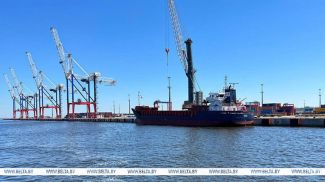MINSK, 18 May (BelTA) – India has terminated an antidumping investigation against the Belarusian petrochemical company Naftan, BelTA learned from the press service of the Belarusian state petrochemical concern Belneftekhim.
Among other things Naftan offers acrylic fiber made by the Polymir plant. The enterprise exports about 80% of the nitron it makes to 25 countries across the globe. In 2017 the enterprise continued selling it to Asian markets such as India, Bangladesh, Iran, Turkey, and Pakistan.
“India could have been lost as a trade partner. Several Indian companies, which make the fiber, initiated an antidumping investigation in 2017 in order to remove the Belarusian competitor,” said the press service. “After hearing out the opinions of the parties concerned in the course of the investigation the Anti-Dumping and Allied Duties Directorate General of the Indian Commerce and Industry Ministry concluded that the local manufacturing sector had not incurred losses due to the Belarusian fiber. The agency does not believe it is advisable to recommend an antidumping duty on imported fiber, including fiber imported from Belarus. The investigation against Naftan Company has been terminated.”
The Belneftekhim press service also told BelTA about the development of the Polymir plant. Technical solutions to improve the safety of manufacturing processes are being introduced in the olefin shop of the second stage of the polyethylene production facility as part of repair and restoration work. Modernization of all the control systems and emergency shutdown devices is part of the plans to restore the shop. Chromatographs will become part of the shop's equipment bearing in mind recommendations of the Swiss company Clariant and the Russian research institute VNIIOS-nauka. The chromatographs will manage hydrogen intake in an automatic mode using analytical data. The feature will make the processes more effective in addition to reducing transhydrogenation. The manufacturing of end products will become more effective as a result.











